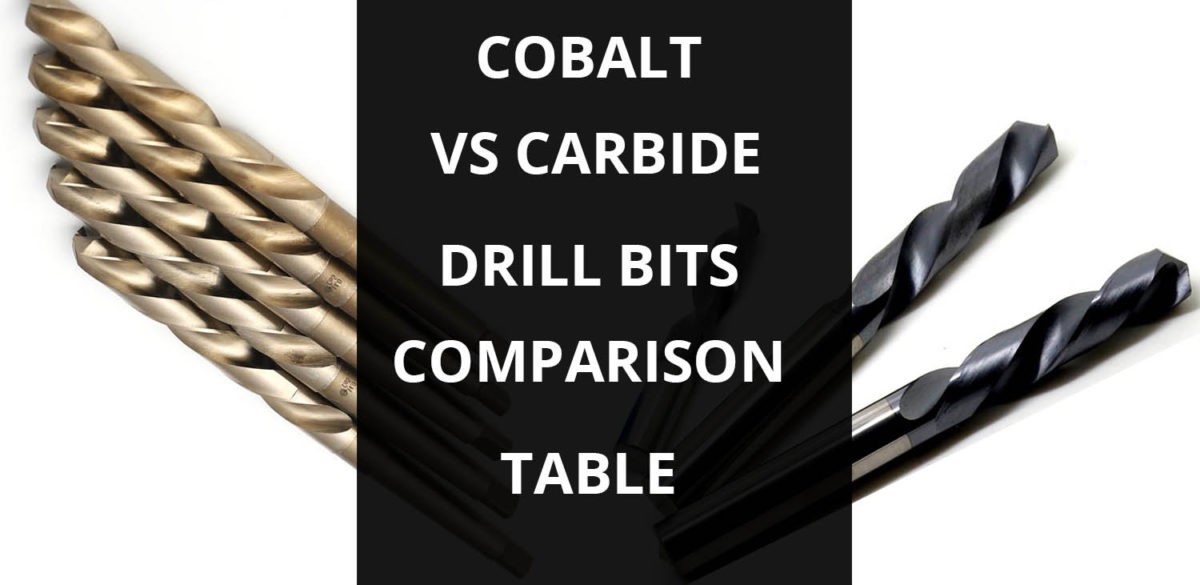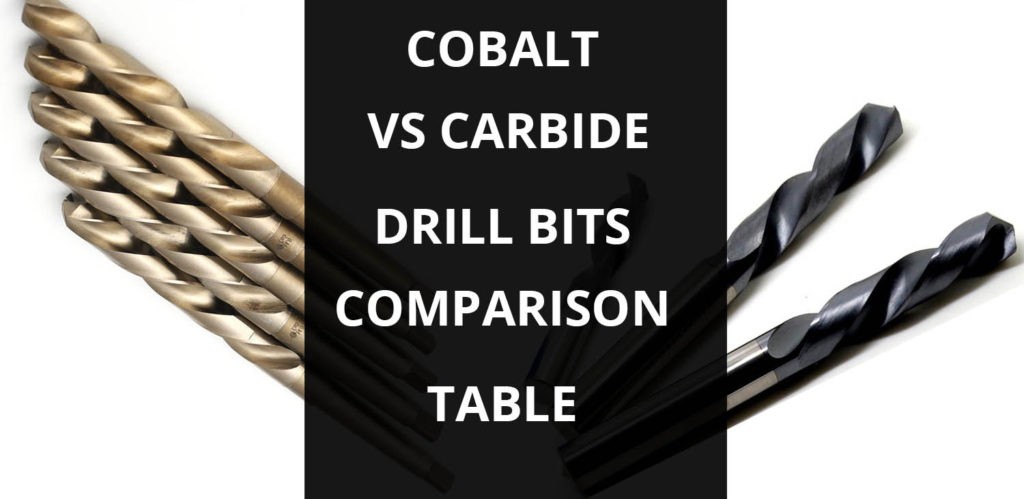Drilling through tough metal is a hard task for the bit, and you need to use appropriate tool to work with tough material. We often hear advices about using solid carbide drill bits for stainless steel, someone else thinks that cobalt drill bits for hardened or stainless steel are irreplaceable. Let’s find out – read our cobalt vs carbide drill bits comparison table to choose the bit that is designed specifically for your task.
Table of Contents
What are they made of? |
|
CobaltBy the legend, the kopolds liked to prank miners by replacing the silver and nickel with a foul metal that was latter called cobaltite and contains arsenic and sulfur. Half the cobalt is used for batteries production, but in the same time the metal is an important part of superalloys – high-performance metals that have high resistance to wear and heat. Powdered cobalt also acts as the “glue” to hold tungsten carbide, titanium, tantalum and niobium carbides to improve the properties of the cutting tools. |
Tungsten Carbide“Carbide” bits and inserts are actually made of tungsten carbide. This compound of carbon and tungsten increased metal cutting feeds and speeds and provided longer life of tool cutting edges. Carbide was first used for cutting 1925. Cemented carbide tips are made of the grains of tungsten carbide, along with particles of additional materials, cemented together with metal cobalt. Without additives, the carbide tool chemically reacts with ferrous materials that leaves craters in the tool. |
Features |
|
| High speed cobalt (HSCO) tools are an upgrade from high speed steel (HSS) due to increased heat resistance because of 5-8% Cobalt in an alloy. Cobalt drill bits are better if you need to make a hole in hardened or stainless steel. | Drill bits made of carbide (Carb) are the hardest and in the same time most brittle bits. Usually, carbide-tipped bits are used in drilling stone and masonry. Full-body carbide bits are capable in drilling the hardest materials but due to brittleness they are used in automated production only. |
Application |
|
| Cobalt drill bits are HSS bits made of a steel alloy with up to 8% cobalt. Most known cobalt alloys are M35 and M42. The 5% cobalt alloy is known as M35 grade, 8% alloy is called M42. Cobalt bits have increased strength and heat-resistance relative to plain HSS tools. For instance, high-quality bits can withstand temperatures of up to 1,100 F. These factors are important when drilling hard materials, such as hardened and stainless steel.
You can easily distinguish cobalt bits from others by a dull gold color that occurs when the tool is baked in the manufacturing process, it’s a coating, true cobalt drill bits are made of solid cobalt alloy. For this reason, they don’t lose their durability and strength after proper sharpening, even if the gold color wears off. Cobalt drill bits are more expensive than HSS and carbide bits, but they tend to last longer so they are good investment for workshop or even DIYer, if he drills often. |
The carbide bits are widely used in industrial application for drilling nonferrous heavy metals, cast iron and abrasive materials. Carb drills keep sharp cutting edge much longer than Cobalt drill bits and cutting speed is higher too as carbide absorb heat better. Drill bits with carbide inserts are effective in making shallow holes and much cheaper than solid carbide tools.
Full body cemented carbide drill bits have superior combination of toughness, strength and durability. Solid carbide bits perform very well when drilling deep holes. Carbide inserts are usually brazed to HSS body and combination or wear carbide resistance and torsional HSS strength makes bit an outstanding tool for work with tough and abrasive materials: cast iron, hard copper, bronze, aluminum and other hard nonferrous materials. Carbide tips are engineered to provide resistance when drilling cast steel and iron, chilled and malleable cast iron, nonferrous light and heavy metals, and particularly abrasive materials at moderate speed. |
Conclusions – Cobalt vs carbide drill bits |
|
| Cobalt drill bits are cheaper, and also can be used to drill stainless and hardened steel. They are less brittle then carbide tools but more brittle then HSS and you may break them if you’re not careful enough. Using drill press will save you a lot of time, efforts and help you to avoid bit breakage. Cobalt bits are often used in general knifemaking. They stay sharp longer and the price is affordable. I’ve used cobalt drill bits to make holes in the case hardened head on allen bolts for safety wire on race bikes and they cut through really well. | Carbide bits can resist more temperature than cobalt and HSS, but in my opinion, for DIY and home use with hand drill and drill press, carbide bits for metal are largely overkill. Maybe you need a mix of cobalt, carbide and HSS bit, but definitely more cobalt than carbide just based on their price. Note, that high-quality HSS bits are also not bad at all. Especially in cutting plastic and another soft material. Usually they have sharper and finer edge and last long for light-duty tasks. Carbide tipped drill bits for masonry are pretty cheap and irreplaceable when drilling stone, cement and masonry |
You really need to keep drill bits sharp. Most bits are not as sharp as you need, sometimes even out of the box. Buy Drill doctor or use a bench grinder. If you decide to choose drill bit sharpener, my advice is to get one of the best ones that will do split points – it helps a lot.







